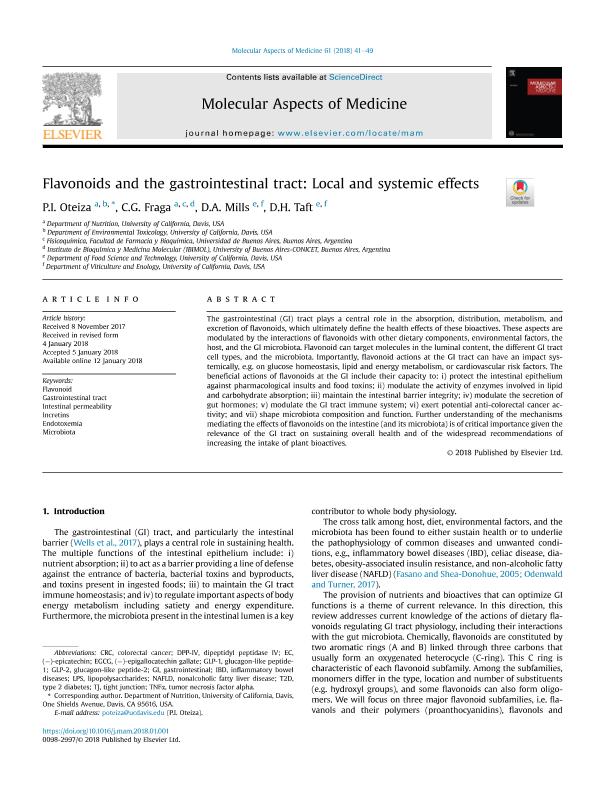Mostrar el registro sencillo del ítem
dc.contributor.author
Oteiza, P. I.
dc.contributor.author
Fraga, César Guillermo

dc.contributor.author
Mills, D. A.
dc.contributor.author
Taft, D. H.
dc.date.available
2019-11-26T20:26:27Z
dc.date.issued
2018-06
dc.identifier.citation
Oteiza, P. I.; Fraga, César Guillermo; Mills, D. A.; Taft, D. H.; Flavonoids and the gastrointestinal tract: Local and systemic effects; Elsevier Science; Molecular Aspects Of Medicine; 61; 6-2018; 41-49
dc.identifier.issn
0098-2997
dc.identifier.uri
http://hdl.handle.net/11336/90571
dc.description.abstract
The gastrointestinal (GI) tract plays a central role in the absorption, distribution, metabolism, and excretion of flavonoids, which ultimately define the health effects of these bioactives. These aspects are modulated by the interactions of flavonoids with other dietary components, environmental factors, the host, and the GI microbiota. Flavonoid can target molecules in the luminal content, the different GI tract cell types, and the microbiota. Importantly, flavonoid actions at the GI tract can have an impact systemically, e.g. on glucose homeostasis, lipid and energy metabolism, or cardiovascular risk factors. The beneficial actions of flavonoids at the GI include their capacity to: i) protect the intestinal epithelium against pharmacological insults and food toxins; ii) modulate the activity of enzymes involved in lipid and carbohydrate absorption; iii) maintain the intestinal barrier integrity; iv) modulate the secretion of gut hormones; v) modulate the GI tract immune system; vi) exert potential anti-colorectal cancer activity; and vii) shape microbiota composition and function. Further understanding of the mechanisms mediating the effects of flavonoids on the intestine (and its microbiota) is of critical importance given the relevance of the GI tract on sustaining overall health and of the widespread recommendations of increasing the intake of plant bioactives.
dc.format
application/pdf
dc.language.iso
eng
dc.publisher
Elsevier Science

dc.rights
info:eu-repo/semantics/openAccess
dc.rights.uri
https://creativecommons.org/licenses/by-nc-sa/2.5/ar/
dc.subject
ENDOTOXEMIA
dc.subject
FLAVONOID
dc.subject
GASTROINTESTINAL TRACT
dc.subject
INCRETINS
dc.subject
INTESTINAL PERMEABILITY
dc.subject
MICROBIOTA
dc.subject.classification
Bioquímica y Biología Molecular

dc.subject.classification
Ciencias Biológicas

dc.subject.classification
CIENCIAS NATURALES Y EXACTAS

dc.title
Flavonoids and the gastrointestinal tract: Local and systemic effects
dc.type
info:eu-repo/semantics/article
dc.type
info:ar-repo/semantics/artículo
dc.type
info:eu-repo/semantics/publishedVersion
dc.date.updated
2019-10-23T21:01:17Z
dc.journal.volume
61
dc.journal.pagination
41-49
dc.journal.pais
Países Bajos

dc.journal.ciudad
Amsterdam
dc.description.fil
Fil: Oteiza, P. I.. University of California. Department of Nutrition and Department of Environmental Toxicology; Estados Unidos
dc.description.fil
Fil: Fraga, César Guillermo. Consejo Nacional de Investigaciones Científicas y Técnicas. Oficina de Coordinación Administrativa Houssay. Instituto de Bioquímica y Medicina Molecular. Universidad de Buenos Aires. Facultad Medicina. Instituto de Bioquímica y Medicina Molecular; Argentina. Universidad de Buenos Aires. Facultad de Farmacia y Bioquímica. Departamento de Química Analitica y Fisicoquímica. Cátedra de Fisicoquímica; Argentina
dc.description.fil
Fil: Mills, D. A.. University of California; Estados Unidos
dc.description.fil
Fil: Taft, D. H.. University of California; Estados Unidos
dc.journal.title
Molecular Aspects Of Medicine

dc.relation.alternativeid
info:eu-repo/semantics/altIdentifier/url/https://www.sciencedirect.com/science/article/pii/S0098299717301590
dc.relation.alternativeid
info:eu-repo/semantics/altIdentifier/doi/https://doi.org/10.1016/j.mam.2018.01.001
Archivos asociados
